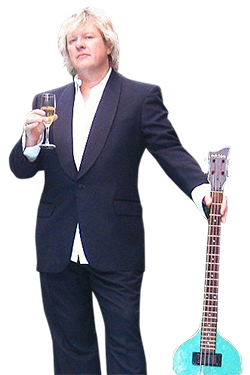
Tom Tom Club’s “Genius of Love” is one of the most ubiquitous songs in all of pop music. The signature cartoonish backbeat has been sampled by everyone from Mariah Carey (“Fantasy”) to Mark Morrison (“Return of the Mack”). This month the band — comprised of husband and wife duo Chris Frantz (drums) and Tina Weymouth (bass) — celebrate their 30th anniversary by reminding the world that, as much as “Genius of Love” has become ours, it’s really still theirs. Tonight the band, who initially formed as a Talking Heads side project, perform “Genius” on Late Night With Jimmy Fallon, and tomorrow they’ll reclaim the stage at New York’s Irving Plaza, bringing their career full circle: Tom Tom Club was the first band to play the storied venue back in 1978. We spoke with Frantz to find out how it feels to still be ahead of the game, even after 30 years.
When the Tom Tom Club started out, dance music and hip-hop were not considered mainstream. Rock and roll was what you played to make money.
Tina and I have always put art before commerce every time.
Now commerce seems to have caught up — dance music and hip-hop are now what reign on the charts, right?
I guess you have a point there — what I meant was we never think about, “Oh, if we did this then we’ll get played on a certain radio station.” We just go for what’s in our hearts and it seems to have worked well for us. We don’t always have huge financial success in everything we do … hang on, the dog is barking. Our beagle.
“Genius of Love” has been sampled so many times, folded and woven into pop culture since its release. It feels like the song has a legacy that mirrors the larger trajectory of music in general. Does that resonate for you?
It was a song that was pioneering. At the time there was nothing that sounded like it, and frankly, except for the people that have sampled it, there still isn’t.
Where did you come up with that hook?
We were down at Compass Point Studios in Nassau in the Bahamas, where we had made two albums — More Songs About Buildings and Food and Remain In Light — prior to that with the Talking Heads. We loved to work there. And [Island Records founder] Chris Blackwell said, “Come on down, make a single, and if I like it, then you can do the whole album.” Chris Blackwell is a guy who realizes that drums and bass can really drive a hit song — a lot of people still thought it was the singer or the guitar player, but he knew differently, having worked in reggae and also with plenty of British bands that had great rhythm sections. The first song we recorded was “Wordy Rappinghood.”
Which is fantastic …
We knew we wanted to do something that people can dance to. With Talking Heads, we had become really well known, but we wanted to make a departure so that we weren’t just doing the same thing with different people. And this was the music we liked. When we wanted to relax and have a good time, we’d put on Bohannon or Parliament Funkadelic, not the Clash. They’re fantastic, but to unwind and have a good time, we preferred Smokey Robinson and the Miracles or James Brown. We also loved reggae music. We were aware of this early new kind of — they didn’t even call them remixes then, they called them megamixes — extended mixes of songs.
How did that bring you to “Genius of Love”?
We worked with a young engineer, Steven Stanley, who knew how to record things in a sort of reggae style. Even though we came out of the punk subculture, by the time we were doing Tom Tom Club we were way beyond punk. There was this one song that I loved called “More Bounce to the Ounce” by a group called Zapp, and “Genius of Love” was inspired by that. If you listen side by side, they’re very different, but the feel of it — a laid-back kind of groove as opposed to a hyper, cocaine kind of groove — it was more laid back and I think that’s one of the reasons why it continues to be perfect for people to rap over. Or play basketball to.
Yes. It’s not aggressively frenetic …
We were also inspired by Kraftwerk. The song sounds nothing like Kraftwerk, but it has space between the notes that a Kraftwerk song would have. A kind of minimalist approach.
Did you know you had something extraordinary when you stumbled on it?
I had an idea. But it wasn’t until Tina did a photo session for a little magazine called New York Rocker — this photographer Laura Levine took a picture of Tina with Grandmaster Flash, both of them with their boomboxes. Grandmaster Flash had his thing, The Adventures of Grandmaster Flash on the Wheels of Steel, his first release, and we had the first Tom Tom Club release. And both were doing really well downtown, at the Mudd Club and Danceteria. So after the photo session Tina brought Grandmaster Flash up to the studio where we were working on The Name of This Band Is Talking Heads and Grandmaster Flash said, “You know you’re going to be hearing this [“Genius of Love”] beat a lot.” And I said, “You think so?” And he said, “I know so. It’s going to be famous.” Of course, he was absolutely right.

